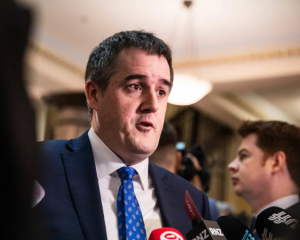Not so long ago, any Green MP who suggested some herbal concoction to ward off Ebola would surely have been deemed by his or her colleagues to be guilty only of being eccentric.
There used to be a lot of it about. Who can forget the senior party official who marked the opening of one Green Party conference by lighting a candle in recognition of any spirits that might have been present or invoke any that delegates wished to be present.
(It had to be extinguished soon after when it fell foul of more earthly and more mundane forces - health and safety regulations.)
No such hippie-derived mysticism is allowed to penetrate the almost corporate-like atmosphere of Green gatherings these days.
The professionalism and discipline now operating within the party organisation was evident in the damage control that swiftly swung into action on Thursday following Steffan Browning's crackpot suggestion that the World Health Organisation start treating Ebola patients with homeopathic remedies.
As the 60-year-old backbencher discovered, the party hierarchy no longer tolerates MPs who hand the party's detractors an excuse to paint the Greens as being as wacky as ever.
Mr Browning was told to retract his musings forthwith to stop them gaining momentum in the media.
He followed that with an admission he had been ''unwise'' to sign an Australian-based petition plugging a homeopathic solution to the pandemic.
When Mr Browning entered Parliament in 2011, there were hopes his track record in campaigning for food safety would see him fill the role opened up by the retirement of Sue Kedgley.
It was not to be.
Mr Browning has been close to invisible.
Worse, he has given the impression the Greens do not view Ebola with the degree of seriousness the public demands of politicians at such times.
This week's ridiculing of Mr Browning was in sharp contrast to the reception accorded to the Greens' sole new MP, James Shaw.
National's Chris Finlayson, who does not make a habit of dishing out plaudits, tagged him as a leader-in-waiting.
Mr Finlayson equates Mr Shaw's strategic thinking with that of Germany's Green Party.
Such a comparison cuts to the very heart of the simmering debate among New Zealand's Greens as to where they should be on the political spectrum and whether they can ever go into coalition with National.
The Greens' unwillingness to do a deal with National has left them dependent on Labour.
It was clear long before this year's election campaign that Labour would not secure enough votes to form a government, making the Greens irrelevant to the outcome.
In contrast, in Germany, relations between the Greens and the Christian Democratic Union, the National Party equivalent, have improved to the point the two parties have held post-election negotiations at a federal level, although not yet a coalition agreement.
However, there have been two such deals struck at state level - in Hamburg in 2008 and in Hesse last year.
Several factors that have made such accommodations possible in Germany are absent from New Zealand's current political climate.
Germany's Greens have been in Parliament for longer than New Zealand's Greens - since 1983 as against 1999.
Germany's Greens have long experience of governing at state and federal level with the Social Democrats, the Labour equivalent.
They are well-versed in the skills of compromise.
The New Zealand Greens have been in opposition since 1999 and have limited negotiating experience.
The German Greens also had the huge advantage of a major, long-running issue on which they could hardly go wrong - closing the country's nuclear power stations.
The shrinking of the Social Democrats' vote has forced the German Greens to confront the previously unthinkable - a deal with the Christian Democrats.
This has been made more possible through the victory of the ''realists'' within the party over the more principled ''fundamentalists''.
The New Zealand Greens have long avoided the equivalent debate.
On one side are those who wish to push the party towards the political centre to give it the option of doing deals with National, increasing the party's leverage over both National and Labour.
There would be far more emphasis on lifting environmental standards and tackling climate change.
On the other side are those who prefer to give equal or higher priority to social justice by offering more help to the low-paid and beneficiaries and fighting child poverty.
In an astute speech last week, co-leader Metiria Turei sought to mollify both sides of what could turn into a highly divisive argument.
To those on the social justice side of the debate, she said it was not the Greens' job to move to the centre.
It was to move the centre towards the Greens.
That has already happened under John Key's brand of ''compassionate conservatism'' and there must be doubt as to whether he can shift National any further to the left.
To appease the centrists, the Greens' leadership has written to the Prime Minister seeking talks on a possible memorandum of understanding to work together on areas of common interest, as the two parties did in 2008 by working together on insulating older houses at a discount rate.
Mr Key's initial response was to raise the stakes by saying he is keeping the prospect of working with the Greens alive - but has hinted a quid pro quo would be the Greens supporting a National government in future.
Mr Key has the advantage.
While it does not take much to change the Government under MMP, Mr Key could call on New Zealand First and Colin Craig's Conservatives if needs be to maintain the hegemony of the centre-right after the next election.
The pressure is very much on Ms Turei and Russell Norman, the Greens' other co-leader. What is clear is that status quo is not really an option.
The Greens may well inch towards dealing post-election with National at some unspecified point in the future but there is going to be no rush on anyone's part.
• John Armstrong is The New Zealand Herald political correspondent.












